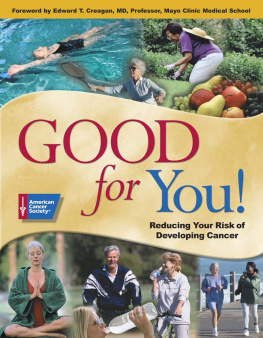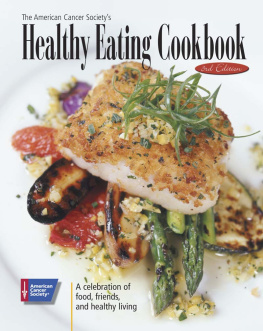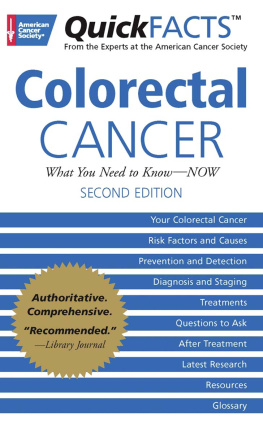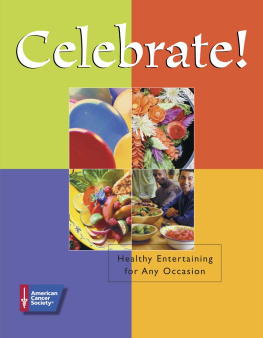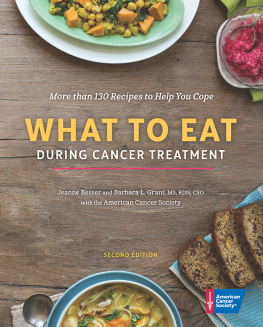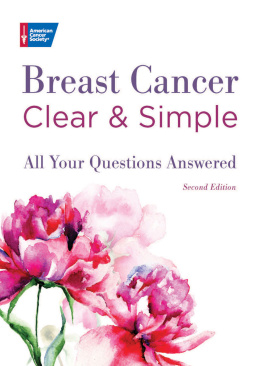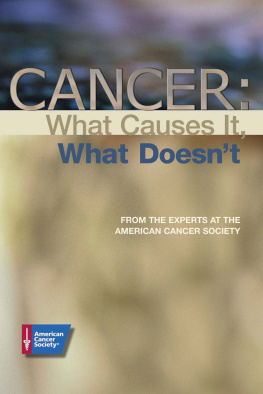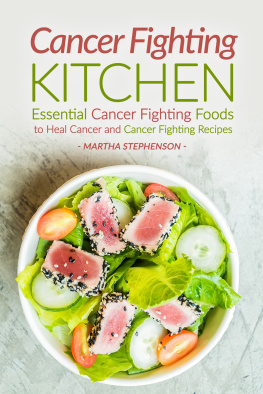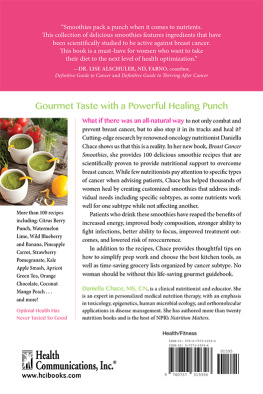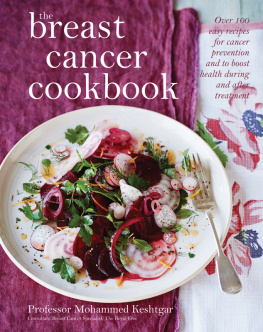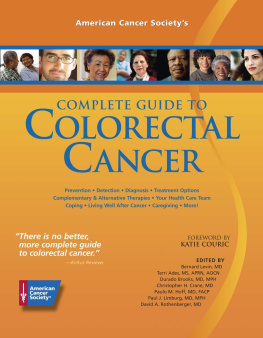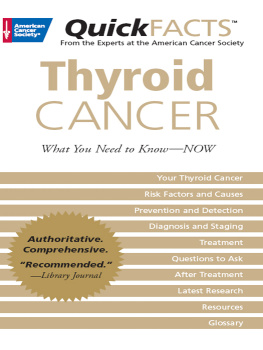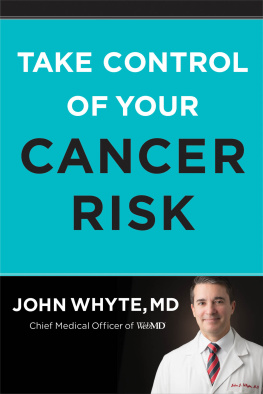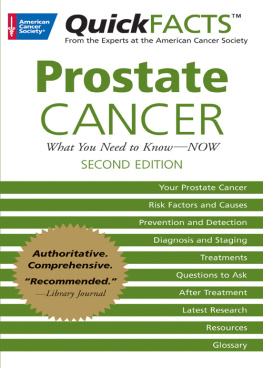
B OOKS P UBLISHED BY THE A MERICAN C ANCER S OCIETY
A Breast Cancer Journey: Your Personal Guidebook
American Cancer Societys Complementary and Alternative Cancer Methods Handbook
American Cancer Societys Guide to Complementary and Alternative Cancer Methods
American Cancer Societys Guide to Pain Control
Cancer in the Family: Helping Children Cope with a Parents Illness, Heiney et al.
Caregiving: A Step-By-Step Resource for Caring for the Person with Cancer at Home, Houts and Bucher
Colorectal Cancer: A Thorough and Compassionate Resource for Patients and Their Families, Levin
Coming to Terms with Cancer: A Glossary of Cancer-Related Terms, Laughlin
Consumers Guide to Cancer Drugs, Wilkes et al.
Crossing Divides: A Couples Story of Cancer, Hope, and Hiking Montanas Continental Divide, Bischke
Informed Decisions, The Complete Book of Cancer Diagnosis, Treatment, and Recovery, 2nd Edition, Eyre et al.
Our Mom Has Cancer, Ackermann and Ackermann
Prostate Cancer: What Every Manand His FamilyNeeds to Know, Revised Edition, Bostwick et al.
Women and Cancer: A Thorough and Compassionate Resource for Patients and Their Families, Runowicz et al.
A LSO BY THE A MERICAN C ANCER S OCIETY
American Cancer Societys Healthy Eating Cookbook: A Celebration of Food, Friends, and Healthy Living, 2nd Edition
Celebrate! Healthy Entertaining for Any Occasion
Kids First Cookbook: Delicious-Nutritious Treats to Make Yourself
Published by
American Cancer Society
Health Content Products
1599 Clifton Road NE
Atlanta, Georgia 30329, USA
Copyright 2002 American Cancer Society
All rights reserved. Without limiting the rights under copyright reserved above, no part of this publication may be reproduced, stored in or introduced into a retrieval system, or transmitted, in any form or by any means (electronic, mechanical, photocopying, recording, or otherwise), without the prior written permission of the publisher.
Printed in the United States of America
Designed by Jill Dible
Cover designed by Jill Dible
5 4 3 2 1 02 03 04 05 06
Library of Congress Cataloging-in-Publication Data
Good for you! : reducing your risk of developing cancer.
p. cm.
Includes index.
ISBN 0-944235-38-7 (pbk. : alk. paper)
1. Cancer--Prevention. I. American Cancer Society.
RC268 .G663 2002
616.994052--dc21
2001008075
A NOTE TO THE READER
The information contained in this book is not intended as medical advice and should not be relied upon as a substitute for consulting with your physician. This information may not address all possible actions, precautions, side effects, or interactions. All matters regarding your health require the supervision of a physician who is familiar with your medical needs. For more information, contact your American Cancer Society at 1-800-ACS-2345 (www.cancer.org).
Managing Editor
Katherine Bruss, Psy.D.
Editor
Anneke Smith
Production Editors
Lisa Dunlap
Beverly Greene
Thomas J. Gryczan, M.S.
Contributor
Sandra J. Wendel, Consumer Health Writer
Editorial Review
Terri Ades, R.N., M.S., A.O.C.N.
Rick Alteri, M.D.
Colleen Doyle, M.S., R.D.
Ted Gansler, M.D., M.B.A.
Marji McCullough, Sc.D., R.D.
Mary OConnell
Robert Smith, Ph.D.
Michael Thun, M.D.
Ron Todd, M.S., Ed.D.
Editorial and New Media Director
Chuck Westbrook
Director, Publishing Strategy
Diane Scott-Lichter
Book Publishing Manager
Candace Magee
CONTENTS
Foreword
C ancer is one of the most feared words among the American population. The impression most people have, despite advances in treatment, is pain, suffering, and an untimely death. What this book demonstrates is that you can take charge of your lifestyle and your health. You are clearly in the drivers seat when it comes to your own health. Youre in charge, and you can definitely decrease your risk for cancer.
I have had more than 50,000 patient encounters over the course of my career as a cancer doctor. If I could have talked with my patients years before they came into my exam room at the Mayo Clinic, this is what I would have shared with them: well over half of all cancers are related to lifestyle issues smoking, alcohol, lack of exercise, too much sun exposure, and an unhealthy diet. If detected early, many cancers can be effectively treated. So we can be proactive and shift the odds in our favor to minimize our risks for cancer. How? By being attentive to how we live and making some changes in our lifestyle and finding cancer early.
Cancer is not a genetically done deal. In other words, if you have a strong family history of cancer, you are not destined to develop cancer and succumb to this disease. Nor is cancer a case of roulette, a random selection of cards, or a roll of the dice. By ignoring our choices, we can put ourselves behind the 8-ball, deal ourselves a lousy hand, or give ourselves an unplayable lie; however, with smart choices, we can position ourselves so that our lives can be productive, creative, and meaningful. We each can indeed make the world a little better than it is right now. But we have to be here to do that.
The choice is always yours. The information is available, right here, to help guide you in appropriate directions. I urge you to use this book as a practical, user-friendly, and hands on guide, compass, and lighthouse to help you navigate through the stormy waters of understanding your cancer risk.
I cannot emphasize enough the importance of early detection and screening. For the vast majority of cancer types, the earlier they are detected, the greater the probability of cure.
With the bewildering variety of information available through print and the Internet, it is very difficult for the informed consumer to know where to turn. This book presents some easy-to-understand recommendations so that you can clearly position yourself to make responsible and credible choices. Please join us on this journey. The road to good health starts with your first step. Simply turn the page (literally and symbolically).
I am humbled and honored to have been asked by the American Cancer Society to write the foreword for this must-read book.
E DWARD T. C REAGAN, M.D.
Professor, Mayo Clinic Medical School
American Cancer Society Professor of Clinical Oncology
John and Roma Rouse Professor of Humanism in Medicine
Associate Medical Editor, MayoClinic.com
Introduction
Be aware of wonder. Live a balanced lifelearn some and think some and draw and
paint and sing and dance and play and work every day some.
R OBERT F ULGHUM
How would you answer this question?
Thinking of all types of health problems, what do you feel is the single most important health problem that you could personally face in the future?
If you were like most Americans polled by the American Cancer Society (ACS), you would likely respond, Cancer. Heart disease was the second response and only serious contender. Other than cancer and heart disease, what health issues should we worry about? Just a handful of people named diabetes, high blood pressure, AIDS, or obesity as their health problems of greatest concern.
Next page
